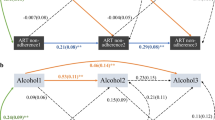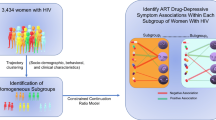Abstract
The impact of depressive symptoms on ART initiation among Russian HIV-infected heavy drinkers enrolled in a secondary HIV prevention trial (HERMITAGE) was examined. We assessed 133 participants eligible for ART initiation (i.e., CD4 count <350 cells/μl) who were not on ART at baseline. Depressive symptom severity and ART use were measured at baseline, 6- and 12-months. Association between depressive symptoms and subsequent ART initiation was evaluated using GEE logistic regression adjusting for gender, past ART use, injection drug use and heavy drinking. Depressive symptom severity was not significantly associated with lower odds of initiating ART. Cognitive depression symptoms were not statistically significant (global p = 0.05); however, those with the highest level of severity had an AOR of 0.25 (95 % CI 0.09–0.71) for delayed ART initiation. Although the effect of depression severity was not significant, findings suggest a potential role of cognitive depression symptoms in decisions to initiate ART in this population.
Resumen
En este artículo se examina el impacto de síntomas depresivos en la decisión de bebedores de riesgo, infectados con VIH, para iniciar el TARV. Ellos fueron inscritos en un estudio en Rusia diseñado para prevenir el contagio del VIH en otras personas (HERMITAGE). Evaluamos a 133 participantes elegibles para comenzar el tratamiento TARV (i.e., recuento de CD4 < 350 células/μl) quienes no estaban en TARV al inicio del estudio. La severidad de los síntomas depresivos y el uso de TARV fueron medidos a 0, 6 y 12 meses. La asociación entre síntomas depresivos y la subsecuente iniciación de TARV fue evaluada usando regresión logística GEE ajustada por género, antiguo uso del TARV, uso de drogas inyectadas y uso de alcohol en exceso. La severidad de síntomas depresivos no está significativamente asociada con menores probabilidades de comenzar TARV. Síntomas de depresión cognitiva no fueron estadísticamente significantes (global p = 0.05); sin embargo, aquellos con mayor nivel de severidad tenían un ORA de 0.25 (95 % IC 0.09-0.71) en el retraso para iniciar TARV. Aunque los efectos de la severidad de la depresión no fueron significantes, los resultados sugieren un rol potencial de los síntomas de la depresión cognitiva en las decisiones para iniciar TARV en esta población.
Similar content being viewed by others
References
Pence BW, O’Donnell JK, Gaynes BN. Falling through the cracks: the gaps between depression prevalence, diagnosis, treatment, and response in HIV care. AIDS. 2012;26(5):656–8.
Eller LS, Bunch EH, Wantland DJ, et al. Prevalence, correlates, and self-management of HIV-related depressive symptoms. AIDS Care. 2010;22(9):1159–70.
Cruess DG, Petitto JM, Leserman J, et al. Depression and HIV infection: impact on immune function and disease progression. CNS Spectr. 2003;8(1):52–8.
Ickovics JR, Hamburger ME, Vlahov D, et al. Mortality, CD4 cell count decline, and depressive symptoms among HIV-seropositive women: longitudinal analysis from the HIV epidemiology research study. JAMA. 2001;285(11):1466–74.
Leserman J, Petitto JM, Golden RN, et al. Impact of stressful life events, depression, social support, coping, and cortisol on progression to AIDS. Am J Psychiatry. 2000;157(8):1221–8.
Leserman J, Whetten K, Lowe K, Stangl D, Swartz MS, Thielman NM. How trauma, recent stressful events, and PTSD affect functional health status and health utilization in HIV-infected patients in the south. Psychosom Med. 2005;67(3):500–7.
Leserman J. Role of depression, stress, and trauma in HIV disease progression. Psychosom Med. 2008;70(5):539–45.
Baum MK, Rafie C, Lai S, Sales S, Page JB, Campa A. Alcohol use accelerates HIV disease progression. AIDS Res Hum Retrovir. 2010;26(5):511–8.
Cook RL, Sereika SM, Hunt SC, Woodward WC, Erlen JA, Conigliaro J. Problem drinking and medication adherence among persons with HIV infection. J Gen Intern Med. 2001;16(2):83–8.
Spies G, Asmal L, Seedat S. Cognitive-behavioural interventions for mood and anxiety disorders in HIV: a systematic review. J Affect Disord. 2013;150(2):171–80.
O’Cleirigh C, Skeer M, Mayer KH, Safren SA. Functional impairment and health care utilization among HIV-infected men who have sex with men: the relationship with depression and post-traumatic stress. J Behav Med. 2009;32(5):466–77.
Gonzalez JS, Batchelder AW, Psaros C, Safren SA. Depression and HIV/AIDS treatment nonadherence: a review and meta-analysis. J Acquir Immune Defic Syndr. 2011;58(2):181–7.
Gore-Felton C, Koopman C. Behavioral mediation of the relationship between psychosocial factors and HIV disease progression. Psychosom Med. 2008;70(5):569–74.
Safren SA, O’Cleirigh CM, Bullis JR, Otto MW, Stein MD, Pollack MH. Cognitive behavioral therapy for adherence and depression (CBT-AD) in HIV-infected injection drug users: a randomized controlled trial. J Consult Clin Psychol. 2012;80(3):404–15.
Department of Health and Human Services. Guidelines for the use of antiretroviral agents in HIV-1-infected adults and adolescents. http://www.aidsinfo.nih.gov/contentfiles/lvguidelines/adultandadolescentgl.pdf. Accessed 30 Aug 2012.
Holmberg SD, Palella FJ Jr, Lichtenstein KA, Havlir DV. The case for earlier treatment of HIV infection. Clin Infect Dis. 2004;39(11):1699–704.
Spire B, Lucas GM, Carrieri MP. Adherence to HIV treatment among IDUs and the role of opioid substitution treatment OST). Int J Drug Policy. 2007;18(4):262–70.
Himelhoch S, Moore RD, Treisman G, Gebo KA. Does the presence of a current psychiatric disorder in AIDS patients affect the initiation of antiretroviral treatment and duration of therapy? J Acquir Immune Defic Syndr. 2004;37(4):1457–63.
Tegger MK, Crane HM, Tapia KA, Uldall KK, Holte SE, Kitahata MM. The effect of mental illness, substance use, and treatment for depression on the initiation of highly active antiretroviral therapy among HIV-infected individuals. AIDS Patient Care STDS. 2008;22(3):233–43.
Fairfield KM, Libman H, Davis RB, Eisenberg DM. Delays in protease inhibitor use in clinical practice. J Gen Intern Med. 1999;14(7):395–401.
Sambamoorthi U, Walkup J, Olfson M, Crystal S. Antidepressant treatment and health services utilization among HIV-infected Medicaid patients diagnosed with depression. J Gen Intern Med. 2000;15(5):311–20.
Murray LK, Semrau K, McCurley E, et al. Barriers to acceptance and adherence of antiretroviral therapy in urban Zambian women: a qualitative study. AIDS Care. 2009;21(1):78–86.
Kalichman SC, Graham J, Luke W, Austin J. Perceptions of health care among persons living with HIV/AIDS who are not receiving antiretroviral medications. AIDS Patient Care STDS. 2002;16(5):233–40.
Bhatia R, Hartman C, Kallen MA, Graham J, Giordano TP. Persons newly diagnosed with HIV infection are at high risk for depression and poor linkage to care: results from the steps study. AIDS Behav. 2011;15(6):1161–70.
Martinez P, Andia I, Emenyonu N, et al. Alcohol use, depressive symptoms and the receipt of antiretroviral therapy in southwest Uganda. AIDS Behav. 2008;12(4):605–12.
Joint United Nations Programme on HIV/AIDS (UNAIDS). Global report: UNAIDS report on the global AIDS epidemic, 2010. http://www.unaids.org/documents/20101123_GlobalReport_em.pdf. Accessed 30 Aug 2012.
Samet JH. Russia and human immunodeficiency virus—beyond crime and punishment. Addiction. 2011;106(11):1883–5.
Baliunas D, Rehm J, Irving H, Shuper P. Alcohol consumption and risk of incident human immunodeficiency virus infection: a meta-analysis. Int J Public Health. 2010;55(3):159–66.
Drumright LN, Patterson TL, Strathdee SE. Club drugs as causal risk factors for HIV acquisition among men who have sex with men: a review. Subst Use Misuse. 2006;41(10–12):1551–601.
Maisto SA, Carey MP, Carey KB, Gordon CM. The effects of alcohol and expectancies on risk perception and behavioral skills relevant to safer sex among heterosexual young adult women. J Stud Alcohol. 2002;63(4):476–85.
Kalichman SC, Simbayi LC, Vermaak R, Jooste S, Cain D. HIV/AIDS risks among men and women who drink at informal alcohol serving establishments (Shebeens) in Cape Town, South Africa. Prev Sci. 2008;9(1):55–62.
Fromme K, Katz E, D’Amico E. Effects of alcohol intoxication on the perceived consequences of risk taking. Exp Clin Psychopharmacol. 1997;5(1):14–23.
Prause N, Staley C, Finn P. The effects of acute ethanol consumption on sexual response and sexual risk-taking intent. Arch Sex Behav. 2011;40(2):373–84.
George WH, Davis KC, Norris J, et al. Indirect effects of acute alcohol intoxication on sexual risk-taking: the roles of subjective and physiological sexual arousal. Arch Sex Behav. 2009;38(4):498–513.
Safika I, Johnson TP, Levy JA. A venue analysis of predictors of alcohol use prior to sexual intercourse among female sex workers in Senggigi, Indonesia. Int J Drug Policy. 2011;22(1):49–55.
Boden JM, Fergusson DM, Horwood LJ. Alcohol and STI risk: Evidence from a new zealand longitudinal birth cohort. Drug Alcohol Depend. 2011;113(2–3):200–6.
Azar MM, Springer SA, Meyer JP, Altice FL. A systematic review of the impact of alcohol use disorders on HIV treatment outcomes, adherence to antiretroviral therapy and health care utilization. Drug Alcohol Depend. 2010;112(3):178–93.
Wolfe D, Carrieri MP, Shepard D. Treatment and care for injecting drug users with HIV infection: a review of barriers and ways forward. Lancet. 2010;37(9738):355–66.
Sarang A, Rhodes T, Sheon N, Page K. Policing drug users in Russia: risk, fear, and structural violence. Subst Use Misuse. 2010;45(6):813–64.
Beck AT, Steer RA, Brown GK. Manual for the beck depression inventory-II. San Antonio: Psychological Corporation; 1996.
Kalichman SC, Rompa D, Cage M. Distinguishing between overlapping somatic symptoms of depression and HIV disease in people living with HIV/AIDS. J Nerv Ment Dis. 2000;188(10):662–70.
Beck AT. Depression inventory, Beck. Russian translation. Aaron T. Beck: Pearson Education, Inc.; 1996. 2007.
Steer RA, Ball R, Ranieri WF, Beck AT. Dimensions of the beck depression inventory-II in clinically depressed outpatients. J Clin Psychol. 1999;55(1):117–28.
World Health Organization. Gender and women’s mental health. http://www.who.int/mental_health/prevention/genderwomen/en. Accessed 28 March 2013.
Weatherby NL, Needle R, Cesari H, et al. Validity of self-reported drug use among injection drug users and crack cocaine users recruited through street outreach. Eval Program Plann. 1994;17(4):347–55.
Sobell LC, Sobell MB. Timeline follow-back: a technique for assessing self-reported ethanol consumption. Totowa: Humana Press; 1992.
National Institute on Alcohol Abuse and Alcoholism (NIAAA). Moderate & binge drinking. http://www.niaaa.nih.gov/alcohol-health/overview-alcohol-consumption/moderate-binge-drinking. Accessed 15 Dec 2012.
Kalichman SC, Ramachandran B, Catz S. Adherence to combination antiretroviral therapies in HIV patients of low health literacy. J Gen Intern Med. 1999;14(5):267–73.
Diggle P, Liang KY, Zeger SL. Analysis of longitudinal data. New York: Clarendon Press; Oxford University Press; 1995.
SAS Institute Inc. SAS/STAT® 9.2. 2008.
Tran BX, Ohinmaa A, Duong AT, et al. Changes in drug use are associated with health-related quality of life improvements among methadone maintenance patients with HIV/AIDS. Qual Life Res. 2012;21(4):613–23.
Chander G, Himelhoc S, Moore RD. Substance abuse and psychiatric disorders in HIV-positive patients: epidemiology and impact on antiretroviral therapy. Drugs. 2006;66(6):769–89.
Sullivan LE, Saitz R, Cheng DM, Libman H, Nunes D, Samet JH. The impact of alcohol use on depressive symptoms in human immunodeficiency virus-infected patients. Addiction. 2008;103(9):1461–7.
Farley J, Miller E, Zamani A, et al. Screening for hazardous alcohol use and depressive symptomatology among HIV-infected patients in Nigeria: prevalence, predictors, and association with adherence. J Int Assoc Physicians AIDS Care (Chic). 2010;9(4):218–26.
Ferguson CJ, Stanley M, Souchek J, Kunik ME. The utility of somatic symptoms as indicators of depression and anxiety in military veterans with chronic obstructive pulmonary disease. Depress Anxiety. 2006;23(1):42–9.
Basu S, Chwastiak LA, Bruce RD. Clinical management of depression and anxiety in HIV-infected adults. AIDS. 2005;19(18):2057–67.
Acknowledgments
The study was supported by the National Institute on Alcohol Abuse and Alcoholism: R01AA016059, U24AA020778, U24AA020779, and K24AA15674. We appreciate the editorial assistance of Marlene C. Lira and translation service of Laura Wulach in the preparation of this manuscript.
Author information
Authors and Affiliations
Corresponding author
Rights and permissions
About this article
Cite this article
Goodness, T.M., Palfai, T.P., Cheng, D.M. et al. Depressive Symptoms and Antiretroviral Therapy (ART) Initiation Among HIV-Infected Russian Drinkers. AIDS Behav 18, 1085–1093 (2014). https://doi.org/10.1007/s10461-013-0674-y
Published:
Issue Date:
DOI: https://doi.org/10.1007/s10461-013-0674-y




